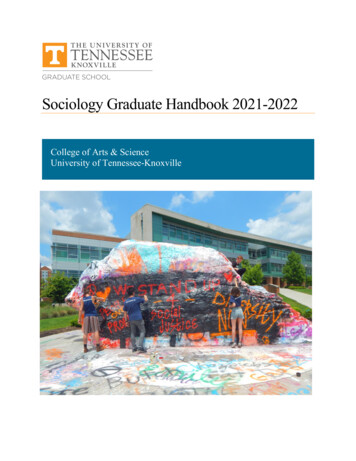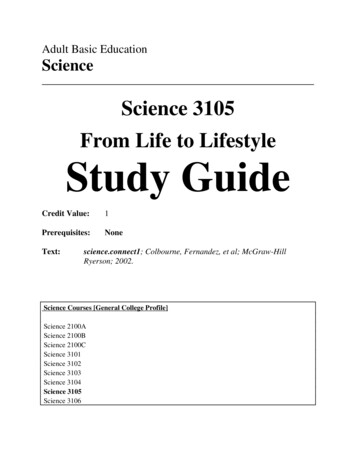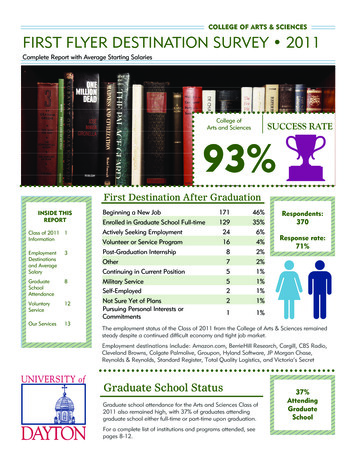
Transcription
Sociology Graduate Handbook 2021-2022College of Arts & ScienceUniversity of Tennessee-Knoxville
Table of ContentsDEPARTMENT HEAD WELCOMEThe Specialty Areas12INTRODUCTIONThe Graduate SchoolAdministration of the Department’s Graduate Program223GENERAL DUTIES/RESPONSIBILITIES3ADMISSION REQUIREMENTS AND APPLICATION PROCEDURESAdmission to the Graduate SchoolAdmission to the Department of SociologyChange of Program4444FINANCIAL SUPPORTGraduate Assistantships and AssociateshipsThe Graduate SchoolTravel supportDissertation Research Funds44566INFORMATION FOR NEW STUDENT COHORTSRegistrationFaculty AdvisorsGraduate Student Employee InsuranceThesis and DissertationDepartmental Courses667777REGISTRATION AND ADVISINGNew Student Class RegistrationAdvising and Class Pre-Registration888THE MA DEGREE IN SOCIOLOGYRequired Course WorkThesis CommitteeThesis Proposal MeetingThesis Defense899910THE PHD DEGREE IN SOCIOLOGYStudents without thesis or with thesis from other disciplinesRequired Course WorkThe DissertationDissertation CommitteeDissertation Proposal HearingAdmission to CandidacyDissertation Defense1010111111121212THE MAJOR AREA PAPERMAP Timing1213
Makeup and Function of the MAP CommitteeMAP Reading ListContent of the MAPFormat of the MAPMAP Evaluation1313131314STANDING AND APPEALSAnnual ReviewsNormal ProgressOther EvaluationsHuman Subjects ReviewDismissal from Graduate ProgramPetitions and Special RequestsWork Requirements for Funded StudentsGrievances and Appeals151516171717171818GRADUATE FACULTY18RESOURCES ON CAMPUS19FORMS20
Department Head WelcomeWelcome to the Department of Sociology’s Graduate Program at the University of Tennessee-Knoxville!The purpose of this Handbook is to familiarize graduate students with the content, admissions procedures,policies, and requirements of the program. Faculty members teach, conduct research, and perform servicein ways that are consistent with the Department’s Vision:Our sociological research and teaching are inspired by our understanding of social justice andour drive for excellence. Social justice can only be realized when the causes of injustice areclear. Such clarity is gained through rigorous empirical analysis guided by theory. Analysis canthen enrich teaching and learning, contribute to public policy formation, and serve in varioussocial settings to achieve a just society.and our Mission Statement:The Department of Sociology strives to be an exemplar of an academic unit focused on socialjustice. Our mission is to maintain excellence and further strengthen our national and globalreputation in and across four specialty areas: Criminology, Environmental Sociology, PoliticalEconomy and Globalization, and Critical Race and Ethnic Studies. Of these specialty areas, threeare not commonly found in US Sociology departments, and the combination of the four is notfound in any. This distinction provides a unique identity and supports our determination torecruit and retain highly capable and motivated graduate students from around the nation andthe world who are committed to advancing the kind of knowledge the Department stands for andis pursuing. In addition, this identity presents an array of unique opportunities to our students.We are dedicated to collaboration across those core areas.Our four specialty areas allow us to address questions of social justice and injustice byexamining institutions and practices that are at the root of both. Social justice requires rigorousexamination of data and focused theoretical analysis of the structural causes of injustice, harm,and hardship. Our research directly translates into continuous enhancement of teaching andlearning, formulation of public policies (especially in our four specialty areas), and organizationof forums dedicated to promoting a just society. In a just society, opportunities are determinedaccording to abilities and drive rather than locations within the social structures into whichpeople are born. Furthermore, in a just society, the interests of nonhumans are promoted alongwith the interests of humans.The Department of Sociology also aims to exemplify the value and benefits of diversity. Inboth our work and our departmental community we endeavor to foster: remediation of persistentinequalities suffered by those who are oppressed and marginalized, broad representation ofpositions and identities and qualitative social transformation, and active participation in suchtransformation as teachers and researchers. We consciously work toward understanding theroots of oppression and harm, and we conscientiously use this knowledge to recruit, attract andretain faculty and students from diverse populations and marginalized and oppressed groups.The Department offers programs leading to the MA and the PhD degrees. The primary objectives of theGraduate Program are: (1) to offer coursework that equips students with a strong foundation in sociologyand social justice issues and with a depth of knowledge in the basic tools of the discipline; (2) to promotehigh-quality teaching; and (3) to provide professional socialization that prepares students for careers inthe discipline. The Department’s overarching focus on social justice unites faculty members’ researchinterests with graduate curricula.The Specialty AreasAs listed in the mission statement, faculty members’ research centers on the following specialty areas:1
CriminologyEnvironmental SociologyPolitical Economy and Globalization, andCritical Race and Ethnic StudiesFaculty members specializing in Criminology apply a sociological approach to the study of crime andcriminal justice, exploring the linkages between crime phenomena, justice practices and strategies, andthe elusiveness of social justice—both conceptually and practically. In addition, faculty membersinvestigate how race/ethnicity, class, and gender affect offending and victimization as well as criminaljustice experiences. They consider the historically- and politically-specific processes whereby someactions are criminalized. Finally, they examine innovative harm reduction strategies, including restorativejustice and responsive regulatory mechanisms. Their scholarship explores interpersonal, corporate, andstate harm.Faculty members specializing in Environmental Sociology analyze the historical and social bases ofenvironmentalism, the mobilization of grassroots environmental movements, and environmental justice atlocal and global levels. Environmental policies are examined as contributing to social justice in somecircumstances, and as contributing to social injustice in others. Faculty members maintain research tieswith a large number of organizations and programs outside the Department.Political Economy and Globalization faculty members analyze the political and economic foundationsof change in global society, examining contemporary issues in the context of large-scale and long-termhistorical shifts, to understand continuity and change both in global society and in local communities.Seminars focus on the sociology of development, and political, economic, and social institutions andcategories such as class, state, race and ethnicity, gender, markets, and social, nationalist, andrevolutionary movements.The faculty in Critical Race and Ethnic Studies interrogate how racial and ethnic categories coalescearound structural inequalities and across multiple geographies. Race and ethnicity are foundational socialstructures influencing nearly every process in which human beings are engaged. These markers ofdifference shape social life. Seminars focus on enabling students to demystify the claims of dominantgroups about race and ethnicity and to understand overarching themes of social stratification, harm, andhumanity.Stephanie A. BohonProfessor and HeadIntroductionThe Graduate SchoolIn order to serve the mission and vision of the Graduate School and preserve the integrity of graduateprograms at the University of Tennessee, Knoxville, information related to the process of graduateeducation in each department is to be provided for all graduate students. Based on Best Practices offeredby the Council of Graduate Schools, it is important that detailed articulation of the information specific tothe graduate degrees offered in each department/program be disseminated. The Department GraduateHandbook does not deviate from established Graduate School policies (tiny.utk.edu/grad-policies) notedin the Graduate Catalog, but rather provides the specific ways in which those policies are carried out.The purpose of this Handbook is to provide all graduate students in the Department of Sociology a list ofprocedures and policies required for successful degree completion.2
Graduate students are expected to be aware of and satisfy all regulations governing their work and studyat the University. Students should be directed to the Graduate Catalog (tiny.utk.edu/grad-catalog), toHilltopics (hilltopics.utk.edu), and publications on rights and obligations including Appeal /).Administration of the Department’s Graduate ProgramThe Department’s Director of Graduate Studies is the primary administrator of the graduate program, whooperates in conjunction with the three members of the Graduate Program Committee to admit newstudents, monitor the progress of current students, and operate the program within the charge of the fulldepartmental faculty. Meetings of the Graduate Program Committee are open to elected representatives ofthe Sociology Graduate Student Association (with the exception of discussions of individual graduatestudents). The Director of Graduate Studies coordinates an annual Department Orientation for newgraduate students.Director of Graduate Studies:Graduate Program Committee:Graduate Program AdministratorProfessor Lois Presser (lpresser@utk.edu)Assistant Professor Kasey Henricks (henricks@utk.edu)Professor Robert E. Jones (mountain@utk.edu)Associate Professor Tyler Wall (twall3@utk.edu)Ms. Nicole Stephens (nstephe5@utk.edu)General Duties/Responsibilities of Faculty and Graduate StudentsIndividual faculty members as research directors are responsible for providing students with appropriaterecognition for their contributions at conferences and in professional publications. It is the facultymember's responsibility to clarify the principles for determining authorship and recognition at thebeginning of any project.Students are responsible for communicating with the college and their graduate program about changes intheir circumstances that affect their status and progress toward the degree. Students are responsible fordiscussing their expectations regarding acknowledgment of research contributions or intellectual propertyrights with the appropriate person(s) on the research team, preferably early in the project.Departments and graduate programs define specific opportunities for student participation on internalcommittees as they deem appropriate. The University recognizes graduate students’ importantcontributions to governance and decision making at the levels of program, department, college, GraduateSchool and University; specific roles for participation are defined at each level by the relevant governingbodies. Students are responsible for participating in University governance and decision making thatenrich the campus community. Most importantly, students are responsible for satisfying all Universityregulations in a timely fashion.Admission Requirements and Application ProceduresAdmission to the Department of Sociology involves two processes, through the Department and throughGraduate Admissions. The Graduate Catalog (tiny.utk.edu/grad-catalog) provides specific information toassist applicants, including advanced search options, intuitive navigation, and a personal portfolio to storefavorite programs and courses.Admission Through Graduate AdmissionsProcedures include the completed Graduate Application for Admission (gradschool.utk.edu/admissions/);a non-refundable application fee; one official transcript from all colleges and universities attended; and3
scores from the Test of English as a Foreign Language or IELTS, if native language is not English.Scores from the Graduate Record Examination are not required. Admission to the graduate program isthrough the Office of Graduate Admissions (and not through the Department of Sociology)!Admission to the Sociology ProgramThe Department of Sociology requires for admission to the graduate program a minimum gradepoint average of 3.00 and completion of an appropriate previous degree. Students’ admission to theprogram may be contingent on confirmation that the degree is completed. The followingapplication materials must be received via online application by January 15: the completedGraduate School and Departmental application form; three letters of recommendation from personssuited to evaluate applicants’ potential for graduate work; a Statement of Purpose of attendinggraduate school in Sociology; a writing sample; and, for international students, TOEFL or IELTSscores. Applicants are notified of admission status as the decisions are made. Announcements ofawards of financial support are typically made by early April. By state law, international studentsare eligible for funding only after their English proficiency scores are tested and meet the Englishproficiency standards set by the University.Change of ProgramStudents who complete a master’s degree in the Department of Sociology and who wish to beentered into the doctoral program must file a Change of Program ge-of-program/) with the Graduate School as soon aspossible after submitting their thesis to TRACE and paying the appropriate fees. The ThesisCommittee must take a vote on whether or not to admit the student to the PhD program; theGraduate Program Committee will admit the student based on the recommendation of theCommittee.Financial SupportGraduate Assistantships and AssociateshipsThe Department Head awards Graduate Teaching Assistant, Graduate Teaching Associate, and GraduateResearch Associate positions to new and continuing students selected on the basis of merit. Appointmentsare usually made for an academic year though occasionally the appointment may be made for onesemester only. These positions provide a stipend for service, as well as health insurance and a remissionof tuition as stipulated by the University. Extraordinary circumstances may require a student awarded anassistantship to resign from their position during the academic year. In such cases, the student must file aletter with the Department Head describing the circumstances necessitating resignation and must workwith the Director of Graduate Studies on necessary paperwork. Students who are not accepted into adegree program are not eligible for departmental assistantships/graduate associate positions or for loansthrough the Financial Aid Office.Graduate Teaching Assistantships are typically awarded to select entering graduate students who havecompleted fewer than 18 graduate credit hours in Sociology. Graduate Teaching Assistants assist withteaching and advising activities and engage in supervised teaching in Introduction to Sociology and inSocial Justice and Social Change courses.Graduate Teaching Associateships are awarded to selected students who have completed at least 18graduate credit hours in Sociology or a related field. Graduate Teaching Associates are granted soleteaching responsibility for sections of Introduction to Sociology or Social Problems and Social Justice. Inspecial cases of departmental need, Graduate Teaching Associates may be granted the opportunity toteach upper-division courses in the student’s specialty area.4
Graduate Research Associate positions are awarded as funding is available. Faculty members whoseresearch is funded and whose funding includes a stipend for a Graduate Research Assistant makes thoseselections in consultation with the Department Head; the Graduate Program Committee does not makesuch decisions.Funding decisions are made on the basis of the Annual Review (see Standing and Appeals below) andreflect two goals: to support and reward continuing students who progress through the program in atimely fashion; and to admit and support the most qualified new applicants in numbers sufficient tosustain the program in the future. Students admitted without funding may re-apply in the following yearand are encouraged to seek funding from various sources across the University. Contact the Director ofGraduate Studies for assistance. To be awarded and to maintain departmental funding, MA students areexpected to remain on-track to earn the degree in two years and PhD students are expected to remain ontrack to earn the degree in four years.The Department typically funds graduate students for two years at the MA level and four years at the PhDlevel. In some circumstances, assistantships are awarded for additional years of study. The GraduateSchool maintains time limits for the completion of graduate programs: 6 years for the MA degree and 8years for the PhD degree. No request for additional years of funding will be granted that has the studentexceeding the Graduate School time limits.Graduate Students receiving assistantships are appointed at 25 percent time or 50 percent time. Thosereceiving a .25 FTE appointment are required to do an average of ten hours of work per week over a 15week semester. Those receiving a .50 FTE appointment are required to do an average of twenty hours ofwork per week over the length of the semester.The Graduate SchoolOther funding opportunities are managed through the Graduate School, which also awards a limitednumber of fellowships each spring. The Graduate School posts descriptions of available openassistantships on their webpage osts-funding/graduateassistantships/).Additional information and application materials on fellowships are available from November throughJanuary in the Graduate School osts-funding/graduateassistantships/). Awards are typically announced by March 15.Funded students are strongly discouraged from taking on additional income-generating work, as suchwork is likely to slow or jeopardize progress in the graduate program.Travel SupportTravel awards for graduate students participating in international, national and regional professionalconferences on-site are available through the University’s Graduate Student Travel fund administered bythe Graduate Student Senate. For the University’s Graduate Student Travel awards, see the GraduateStudent Senate (http://gss.utk.edu/travel-awards/).Dissertation Research FundsAs of 2014, the Department has funds to provide limited support for PhD students needing assistance withresearch-related expenses, including but not limited to travel to field sites, purchase of equipment, andpurchase of data. Applications are accepted by the ad hoc committee composed of Department Head andDirector of Graduate Studies once per semester (depending on student interest) in fall and springsemesters. Deadlines will be announced in advance.5
Early WithdrawalIf a student is terminated or withdraws from a program prior to the end of the semester, the student will beresponsible for payment of tuition and other fees from the termination/withdrawal date until the end of thesemester. Responsibility for paying tuition and fees will apply to all students, including those who havetuition waivers during the semester in which they are terminated/withdraw early. The Graduate Catalogprovides additional information about early termination/withdrawal (onestop.utk.edu/withdraw). If youare considering early withdrawal, you should contact the Bursar’s office to inquire about financialramifications.Information for New Student CohortsIn July of each year, newly admitted students receive letters from the Director of Graduate Studiesproviding important information about their start in our program. New students are asked to report uponarrival to the Graduate Administrative Assistant in 901 McClung Tower.Full-time students must complete 6 credit hours per semester of approved, graduate-level coursework(amended by faculty in 2012), but the number of credit hours required for full-time status varies withappointments and with loan terms. The number of credits a student registers for may impact their healthinsurance benefits.Graduate students funded at 25 percent must be enrolled for 9 or more credit hours per semester to beconsidered as full-time students by the Department and the University. Graduate students funded at the 50percent level must be enrolled for 6-11 credit hours per semester to be considered full-time students bythe Department and the University. The definition of “full-time study” may differ for students withStafford loans.Students may elect to attend graduate school on a part-time basis, but should be advised that courses arenot guaranteed to be readily available: few required courses are offered every year and few graduateseminars in sociology are offered in the evenings and summers. The Graduate School time limits forcompletion of graduate programs are 6 years for the MA degree and 8 years for the PhD degree.RegistrationNew students should register for classes as soon as possible (usually May) using MyUTK. The nine-digitUT identification number (beginning in 000) is necessary for the registration process, as are NetID andpassword (oit.utk.edu/netid).Faculty AdvisorsThe Graduate School will automatically assign the Director of Graduate Studies (DGS) to serve as youradvisor. The DGS, in turn, will assign you an advisor from among the faculty. The initial assignment of afaculty advisor is intended as temporary. Students may change advisors at any time simply by securingconsent from the chosen advisor and notifying the Director of Graduate Studies and the GraduateAdministrative Assistant. Often the newly chosen advisor and the thesis or dissertation chair are the same,but they need not be. Students are expected to work closely with advisors and/or chairs, meeting at leastonce per semester, and usually more often. The MA and PhD Course Planners, in Excel, are useful toolsfor these meetings.Graduate Student Employee InsuranceGraduate Teaching Assistants and Associates and Graduate Research Assistants who are employed atleast 25% FTE will automatically be enrolled in the Graduate Student Employee Insurance program. TheUniversity pays 100% of the premium for these students. These students may elect to add spouse ordependent coverage at their own expense. If students already have insurance coverage through anotherinsurance carrier, this policy functions as additional coverage. The Student Health Clinic manages the6
Graduate Student Employee Health Insurance Program. For information, ance.php or call 865-974-3135.Thesis and DissertationGraduate students are advised to familiarize themselves with thesis/dissertation requirements as soon aspossible. The Graduate School publishes the Guide to the Preparation of Theses and Dissertations,available for downloading at tothesesdissertations.pdf.Departmental CoursesSubstantive departmental seminars are offered in Criminology, Environmental Sociology, PoliticalEconomy and Globalization, Critical Race and Ethnic Studies, Sociological Theory, and ResearchMethods. Since seminars are typically offered once every two years, it is advisable to take requiredcourses at the earliest opportunity. The core required Theory and Methods courses typically are offeredannually while advanced methods courses are typically offered every other year. These courses need notbe taken in numerical sequence. Statistics courses, offered in the Statistics Department, must be takensequentially.In addition to substantive seminars, other course numbers appear in the catalog:500 Thesis Hours. P/NP. Required.502 Registration for Use of Facilities. S/NC. Permits use of library and other university facilities whenyou are not otherwise registered. Use for the summer only. Hours do not count toward a degree.510 Professional Preparation. S/NC.593 Independent Study. A-F. Student-initiated course that requires faculty member’s approval andagreement to direct. Course requirements determined by faculty member. Use this course to arrangefor a class you would like to take but which is not offered by faculty.599 Readings. A-F. Student-initiated course that requires faculty member's approval and agreement todirect. Course requirements determined by faculty member. Requires form to be filed with theDirector of Graduate Studies. Use this course number to permit time to read a body of literature.600 Doctoral Research and Dissertation. P/NP. Required.628 Supplementary Readings in Major Area. S/NC. Allows preparation time for Major Area Paper(MAP) while maintaining full-time status.649 Supplementary Readings. S/NC.695 Advanced Special Topics. A-F. Typically faculty-initiated but sometimes students-initiated course inwhich students pursue a specific, narrowed focus within the literature.699 Tutorials in Advanced Topics. A-F. Student-initiated course for doctoral student's pursuit of a specialtopic, often involving the examination of a potential dissertation topic. Requires faculty member'sapproval and agreement to direct. Course requirements determined by faculty member. Requiresform to be filed with the Director of Graduate Studies. This course is essentially an independentstudy course for doctoral students who are ABD (have completed All But Dissertation requirements).No more than 12 total credit hours from the following courses will count toward the degree: Sociology510, 593, 599, 695, and 699. Plans for those courses, with the exception of 510, must be approved by thefaculty member directing the course. Plans must specify (1) the nature of the work to be done, and (2)how the work will be evaluated for purposes of assigning a grade.Registration and AdvisingNew Student Class RegistrationNew graduate students need to consult with the Director of Graduate Studies before registering for thefirst semester of coursework. The Director explains and clarifies the curriculum, helps plan a schedule,and advises on Master’s and PhD degree requirements. The course timetable and registration is on7
MYUTK at http://myutk.utk.edu/. (Also see Banner for d.p disp dyn sched). Once new students receive theirUniversity ID number (9 digits) and Net ID they can register on myutk.edu.New students are assigned a work place and new Graduate Teaching Assistants and Graduate TeachingAssociates are informed of their assignment and directed to their graduate teaching supervisor(s) orgraduate mentor.Work places must be completely cleared of all materials by July 1st of the year you graduate. Anyalterations to the work place that you inhabit must be reversed in preparation for new graduate students.Advising and Class Pre-RegistrationEach student must consult with their specialty area faculty advisor prior to registering for classes; thefaculty advisor reviews each student's progress in their course work and advises him/her accordingly as tospecific courses and course load. Students are urged to pre-register so that class offerings and teachingschedules can be adjusted to suit actual needs. The Department Head in consultation with the DGSdetermines the coordination of GTA assignments.The MA Degree in SociologyThe MA degree in Sociology requires a minimum of 30 credit hours beyond the bachelor’s degree. Atleast 21 total credit hours must be completed in 500- and 600-level courses. MA students may take 9credit hours in 400-level courses that carry graduate credit. Twelve (12) credit hours may be taken outsidethe Department. Students should consult with their advisor on these course selections. Students mustcomplete all requirements within 6 calendar years of enrollment.Required Course WorkAll MA students must complete the following requirements (6 courses for 15 credit hours): Sociology 506 Social Justice and Public Policy (2 hours);Sociology 511 Pedagogy and Graduate Instruction (1 hour);Sociology 521 Sociological Theory (3 hours);Sociology 531 Research Methods in Sociology (3 hours); andTwo courses (Foundations and one other) in one specialty area (Criminology, EnvironmentalSociology, Political Economy and Globalization or Critical Race and Ethnic Studies). Choose onefrom Sociology 503, Foundations of Environmental Sociology; Sociology 504, Foundations inPolitical Economy; Sociology 505, Foundations in Criminology; or Sociology 509, Critical Raceand Sociological Foundations of Race and Ethnicity, plus one additional course in the same area.Students entering the MA program who have not completed at least one undergraduate course in statisticsor its equivalent must take Statistics 531 prior to enrolling in Sociology 631. Students may additionallyelect to complete requirements for the Statistics Minor. A minor in statistics consists of 9 hours ofstatistics courses. See the Intercollegiate Graduate Statistics and Data Science Program in the HaslamCollege of Business.MA students are required to complete 9 credit hours of coursework in addition to the required 15 credithours described above and 6 credit hours of 500 Thesis Hours. When a decision is reached about thethesis topic, the student should consult with the faculty member whose interests most closely match thestudent’s and with whom the student can establish a strong working relationship, and request that thefaculty member chair the thesis committee.8
Application for admission to candidacy for the master’s degree should be made as soon as possible afterthe student has completed requ
Director of Graduate Studies: Professor Lois Presser (lpresser@utk.edu) Graduate Program Committee: Assistant Professor Kasey Henricks (henricks@utk.edu) Professor Robert E. Jones (mountain@utk.edu) Associate Professor Tyler Wall (twall3@utk.edu) Graduate Program Administrator Ms. Nicole Stephens (nstephe5@utk.edu)











